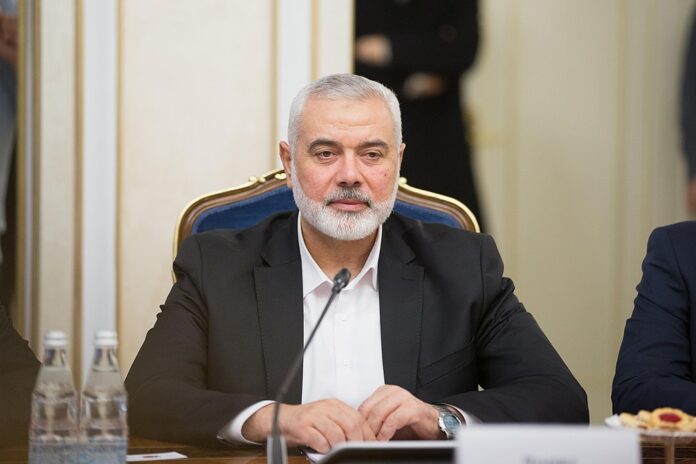Hamas attributes the death of its political chief Ismail Haniyeh to an Israeli strike in Tehran, sparking concerns of escalating conflict
Hamas’s political chief, Ismail Haniyeh, was assassinated in Tehran, Iran, in what the group claims was a targeted attack by Israel. Haniyeh, along with one of his bodyguards, was killed when the building they were staying in was struck. The incident occurred during Haniyeh’s visit to Tehran for the inauguration of Iran’s President Masoud Pezeshkian.
In a statement, Hamas mourned the loss of Haniyeh, whom they described as a “leader and martyr.” The group blamed Israel for the attack, referring to it as a “treacherous Zionist raid.” Iran’s Islamic Revolutionary Guard Corps (IRGC) also confirmed Haniyeh’s death, stating that an investigation into the cause of the attack is underway.
Haniyeh, a prominent figure in Hamas, had been living in Qatar since 2019, after leaving the Gaza Strip. His assassination comes in the context of heightened tensions between Israel and Hamas, following a series of recent escalations. Israel had previously launched a military operation in Gaza, targeting Hamas leaders after an attack on October 7 that resulted in the deaths of over 1,200 people and the capture of more than 200 others.
The news of Haniyeh’s death has resonated deeply within Gaza and the West Bank. Hani Mahmoud, reporting from Gaza, highlighted Haniyeh’s significance as a leader and negotiator, particularly in efforts toward a ceasefire. Haniyeh was known for his pragmatic approach, often viewed as a moderate voice within the Hamas leadership, which made him a key figure in the eyes of many Palestinians.
Analysis:
Political Perspective:
The assassination of Ismail Haniyeh in Tehran is a significant political event with potential repercussions across the Middle East. Haniyeh was a central figure in Hamas, a group classified as a terrorist organization by several countries, including Israel and the United States. His death may disrupt the internal dynamics of Hamas, potentially leading to a power struggle or a shift in strategy. The timing of the assassination, coinciding with his presence at a major political event in Iran, underscores the geopolitical implications, particularly in the context of Iran’s support for Hamas.
Israel’s involvement, as alleged by Hamas, aligns with its historical stance on preemptive strikes against individuals perceived as threats. This action could be interpreted as part of Israel’s broader strategy to weaken Hamas’s leadership and deter future attacks. However, such a high-profile assassination risks escalating tensions not only between Israel and Hamas but also with Iran, a key regional player with its own strategic interests.
Social Perspective:
Haniyeh’s assassination is likely to have profound social impacts, particularly within Palestinian territories. As a figure who was seen as more moderate and pragmatic, his death could deepen divisions within Palestinian society and between various factions. Haniyeh’s background, growing up in a refugee camp and representing a significant portion of the Palestinian population, made him a symbolic figure for many. His death may galvanize public sentiment and potentially lead to increased support for more radical elements within Hamas, complicating efforts toward peace and reconciliation.
Racial Perspective:
The conflict between Israel and Hamas, and broader Israeli-Palestinian relations, are often framed within the context of racial and ethnic identities. Haniyeh’s assassination, attributed to an Israeli action, could exacerbate existing racial and ethnic tensions in the region. It may also influence the perception of Israel’s actions among other ethnic groups in the Middle East, potentially leading to increased solidarity with the Palestinian cause or further polarization.
Gender Perspective:
While gender-specific impacts may not be immediately apparent in the context of Haniyeh’s assassination, the broader conflict continues to have significant gendered dimensions. Women and children in the affected regions often suffer disproportionately from the consequences of violence, including displacement, loss of family members, and long-term psychological trauma. The ongoing conflict and incidents such as this assassination can exacerbate these issues, particularly in terms of access to healthcare, education, and social support for affected populations.
Economic Perspective:
Economically, the assassination could lead to increased instability in Gaza and the broader region, with potential ramifications for local and regional economies. The death of a key political figure can lead to uncertainty, affecting markets and investment. For Gaza, already struggling with economic hardships, the potential for further conflict could exacerbate humanitarian crises, impacting livelihoods and access to basic necessities. In the broader Middle Eastern context, increased tensions could affect trade, tourism, and international relations, particularly if the situation escalates into broader hostilities.
